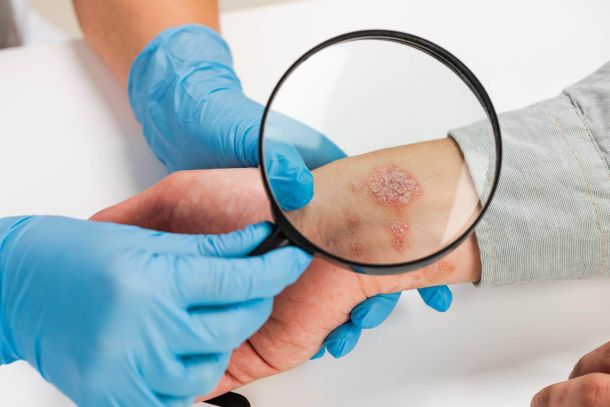Eczema of the nerves: modern methods of recognition and treatment


Viktor Levchenko
What is nervous eczema?
Nervous eczema, also known as nervous eczema or eczema from nerves, is a common dermatological condition associated with psychological factors such as stress and anxiety. Eczema usually manifests as skin inflammation, itching, redness and the formation of small watery vesicles.
Causes of nervous eczema
Causes of eczema from nerves are related to psycho-emotional overstrain and stress. For example, overwork, prolonged nervous tension or exacerbation of chronic stress can provoke the appearance of eczema. Also, nervous eczema often occurs in people with increased nervous excitability.
Symptoms of nervous eczema
Symptoms of nervous eczema include itching, swelling, redness and flaking of the skin. In some cases, a watery rash may form, often on the hands, which, when opened, results in crusts. Most patients report worsening eczema symptoms during periods of increased stress.
Diagnosis of nervous eczema

To diagnose nervous eczema, a comprehensive examination is usually performed, including a history, visual examination of the skin, and allergy tests to rule out other possible causes. In some cases, a skin biopsy may be required to confirm the diagnosis.
Treatment of nervous eczema
Treatment for nervous eczema is usually multidimensional and includes both skin care and medication, as well as psychological support.
It is important to remember the need for hygiene and skin care for nervous eczema. This includes using mild cleansers, avoiding substances that irritate the skin and wearing natural clothing that allows the skin to breathe.
Pharmacological treatment
Anti-inflammatory drugs such as ibuprofen can be used to reduce inflammation and itching.
Antihistamines such as diphenhydramine (Benadryl) can help relieve itching and other allergy symptoms.
Corticosteroid ointments and creams, such as hydrocortisone, are usually used for topical treatment of eczema symptoms.
Psychological support and stress management

Stress management is an important element of treatment. Relaxation, meditation or cognitive-behavioral therapy are often recommended to patients.
Prevention of nervous eczema
Preventing nervous eczema includes managing stress, maintaining a healthy lifestyle, moisturizing the skin, and avoiding excessive contact with water and chemicals. This helps to reduce the risk of developing eczema or the severity of its manifestations.
In conclusion, I should like to stress that nervous eczema is not simply a skin disease, but also an indicator of our emotional state. So when taking care of your skin, don't forget to take care of your mental health.
New materials
Popular Articles
We recommend reading
Contact us in the Contact Us section to ask questions, offer ideas, or for more information about our allergy resource.
Our articles are your trusted source of allergy knowledge. Learn how to make life with allergic reactions easier on our specialized portal.
©
Lechenie-Allergii.com. All rights reserved.
© Lechenie-Allergii.com. All rights reserved.
The information on this site is for informational purposes only and is not a substitute for professional medical advice. We recommend consulting with qualified medical professionals for accurate information and advice.
 English
English  Українська
Українська  Русский
Русский 









